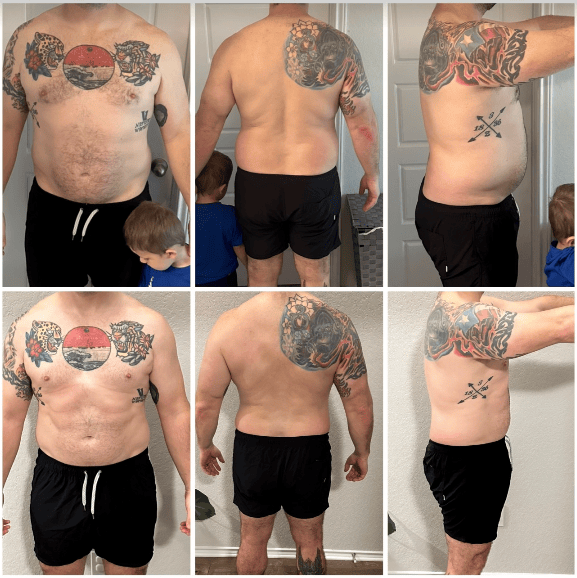Welcome to college! A magical time that’s filled with late-night cramming, last-minute papers, and...healthy meals? Okay, maybe that last part doesn't quite fit the stereotypical college experience for most Americans. But hey, there’s always time to rewrite stereotypes, and we're here to shake things up a bit.
Here at My Fit Foods, we're not just about providing scrumptious meals that'll make you forget all about that greasy pizza slice. We're also on a mission to promote healthy eating habits and a sustainable lifestyle.
We believe being fit and healthy shouldn't be a chore or a bore. It should be as natural and enjoyable as acing that mid-term (okay, maybe a bit more enjoyable than that).
So, are you ready to trade in those unhealthy options for some fresh, wholesome, delectable, healthy food choices? Buckle up because we're about to take you on a joyride to a healthy eating town, college edition.
Why Is it Essential for College Students To Eat Healthy?
Before we dive into the nitty-gritty of how to avoid the siren call of late-night pizza delivery, let's talk about why it's so important to eat healthy in college. You might think, "I'm young, I'm invincible, I can live off ramen and energy drinks!" But trust us, your body and mind beg to differ.
First things first, there's a pretty solid connection between what you eat and how you perform, both physically and academically. Think of your body like a car: If you fill it up with the good stuff, it'll run smoothly. But if you're constantly pumping it with junk, it's only a matter of time before it starts to sputter and stall.
Eating a balanced diet featuring a variety of food groups helps keep your energy levels high, your immune system strong, and your concentration sharp. And let's be honest, who doesn't want to ace their exams and still have the energy to make it to that 8 a.m. class without feeling like a walking zombie?
Now, let's tackle the infamous "freshman 15." While it's more myth than reality (most students gain between 3.5 to 7.8 pounds in their first year, not 15), it's true that many college students do gain weight.
This is often due to factors like less physical activity, more alcohol consumption, and, of course, unhealthy eating habits. The dining hall can be a minefield of high-calorie, low-nutrition food options that can lead to weight gain if you're not careful.
And last but not least, let's chat about your noggin. Your brain, just like the rest of your body, needs the right fuel to function at its best.
Research shows that a diet high in processed foods and sugars can increase your risk for mood disorders like depression and anxiety. On the flip side, a diet rich in whole foods like fresh fruits, veggies, lean proteins, and whole grains can help boost your mood and keep those stress levels in check.
How Can You Navigate the Dining Hall for Healthier Choices?
For many hungry college students, the dining hall is a paradise of endless food options. However, it can also be a labyrinth filled with dietary pitfalls that can quickly add on the pounds. Let's turn that confusion into confidence by arming you with a few healthy eating tips and giving you a map of the healthy options you should aim for in the dining hall.
The first stop is the salad bar. Now, we know what you're thinking, "Salad? How boring!" But hold on a sec, it doesn't have to be. The key is variety.
Mix up your leafy greens (spinach, romaine, arugula), add a rainbow of veggies (carrots, tomatoes, bell peppers), throw in some protein like grilled chicken or hard-boiled eggs, and voila! You've got yourself a nutrient-packed, taste-bud-pleasing meal.
Just remember to go easy on the dressings. They can be sneaky calorie bombs.
Now, let's address the elephant in the room: overeating and the temptation of junk food and fried foods. We get it; those fries are calling your name after a long day of lectures.
But here's a little tactic: try filling up a smaller plate halfway with fruit and veggies, a quarter with lean protein, and a quarter with whole grains. This way, you'll get a balanced meal and still have a little room left for a small treat. Balance, not deprivation, is the name of the game.
This brings us to our final point: the importance of balancing carbs, healthy fats, and proteins. Think of these macronutrients as your dietary holy trinity.
Carbohydrates (the good kind found in whole grains, fruits, and veggies) provide energy, proteins build and repair tissues, and healthy fats (hello, peanut butter, avocado, and olive oil!) support brain function and help your body absorb vitamins.
What Are Some Healthy Snacks for College Students?
First, let's talk about the all-stars of the healthy snack world. Dried fruit (just watch out for added sugars), Greek yogurt (a protein powerhouse), hummus (fiber and protein is an excellent combination), and nut butter (hello, healthy fats) are all fantastic choices that pack a nutritional punch. Pair them with whole grain rice cakes, brown rice, or quinoa, and you've got yourself a mini-meal that's both satisfying and nutritious.
Having these healthy snacks on hand can be a game-changer. Not only do they help curb those mid-afternoon (or late-night) cravings, but they also help maintain your blood sugar levels, preventing those dreaded energy crashes.
Plus, they're a lot less tempting to reach for that bag of chips or cookies when you've got tasty, healthier options readily available. So, hit up the grocery store or browse our healthy snack options to stock your dorm room mini-fridge with a few of these healthy options. That way, you’ll always have a go-to healthy snack when hunger strikes.
A Few More Tips for Maintaining a Healthy Lifestyle in College
Eating healthy is an excellent first step when creating a healthy lifestyle. However, there are a few more things that you should strive for to ensure you’re giving yourself everything you need to succeed.
Staying active is a crucial part of maintaining a healthy lifestyle. It's like the perfect partner to a healthy diet, helping burn off those extra calories and promoting strength and weight loss.
And no, you don't need to become a gym rat (unless that's your thing, of course). Find an activity you enjoy, whether it's dancing, swimming, or just taking a brisk walk around campus.
Next up is hydration. Our bodies are made up of about 60% water, so it's safe to say that staying hydrated is pretty important. Carry a water bottle with you, and aim to drink at least eight cups a day to keep your body topped off with fluids.
And while we know those cups of coffee are a college staple, try to limit your intake. Too much caffeine can lead to dehydration and mess with your sleep.
Speaking of sleep, it plays a huge part in weight management and overall wellness. A lack of sleep can disrupt your metabolism and mess with the hormones that control your appetite, making you feel hungrier than you actually are. The combination of these factors can very quickly lead to weight gain if you’re not careful, so make sure you're catching enough ZZZs at night.
The Bottom Line
Taking steps toward a healthier lifestyle doesn't mean you have to make drastic changes overnight. It's all about the small, sustainable shifts that add up over time. Maybe it's choosing a side salad over fries, taking the stairs instead of the elevator, or swapping that late-night pizza for some Greek yogurt, granola, and fruit.
And remember that you're not in this alone. If you’re ever unsure about what you should be eating, a nutritionist or dietitian can be a great partner in your health journey, offering personalized advice and support. There's also a wealth of resources at your fingertips, from meal-planning apps to healthy cooking tutorials.
Meal prep can also be a game-changer. By planning and prepping your meals ahead of time, you can save yourself from the stress of last-minute unhealthy choices at mealtime, not to mention saving some cash (and who doesn't love that?).
At My Fit Foods, we're all about creating a movement of fit, healthy, and happy individuals. We believe in a holistic approach to health, where eating right, staying active, and caring for your mental health are all part of the package.
So, are you ready to join us on this journey toward a healthier, sustainable lifestyle? Because we're more than ready to have you on board.
Let's make college the start of a degree and a lifetime of good health. Here's to living your best, healthiest life, one delicious meal at a time. Jump on board with My Fit Foods today!
Sources:
Health Benefits of Physical Activity: the Evidence | PMC
Sleep Deprivation: Effects on Weight Loss and Weight Loss Maintenance | PMC
The Water in You: Water and the Human Body | U.S. Geological Survey
Healthy Snack Ideas: Try Out These Nutritious Pairings Next Time the Hunger Hits | USA Today
About Author: Mario Mendias





